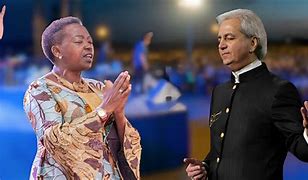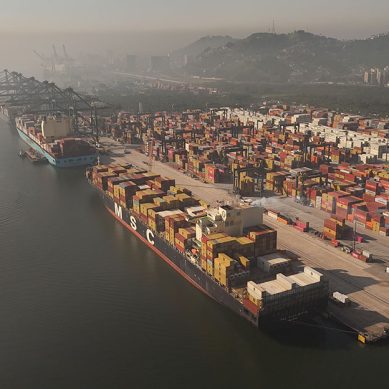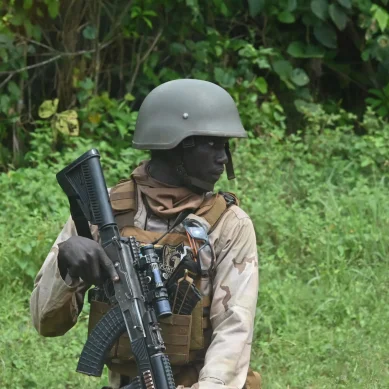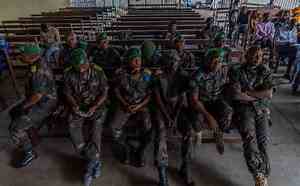
Rising economic and regional security threats to American strategic interests in eastern African are propelling Kenyan President William Ruto to a celebrity in the West, where he has earned the monicker ‘Golden Boy,” with Washington and United Kingdom reportedly willing to overlook his past record as a crimes against humanity and genocide suspect that earned him time in the dock at the International Criminal Court (ICC) at the Hague, Netherlands, in the wake of the 2007 post-election violence.
The positive image has further been bolstered by Kenya’s First Family’s longstanding association with the American Evangelical Churches that resulted in the recent visit to Kenya by renowned televangelist Pastor Benny Hinn from February 24-26.
Ruto’s connection with American evangelism movement is said to have been fostered during the tenure of former Illinois senator Kyle MacCarter as US ambassador, who preceded current US Ambassador to Kenya Margaret “Meg” Whitman. Ambassador MacCarter, Democrat, and his spouse visit Kenya six times a year as they support a children’s home in Kahawa, Nairobi. It is even said they have migrated to Kenya permanently, from where they run their charities.
There is suspicion, though, that the feel-good mood in the executive maybe short-lived given precedence elsewhere in Africa and other developing countries where the poster-boy image President Ruto relishes has ended disastrously with a number of countries coveted by Washington decelerating into dictatorships as exemplified by neighbouring Uganda, Rwanda, Egypt and Sudan.
“There is no possibility of Joe Biden snubbing Ruto because of the evangelicals who are here unlike Trump. The other reason is that it an election year n the US and the Biden administration is doing everything they can to avoid sending boots on the ground (in Haiti). Another reason, again, is that there is no peace to keep in Haiti. There is no way Kenyan police is going to arrive in Haiti. There are no logistics for 5,000 police officers from eight different countries without common command, no common doctrines, no heavy weapons if they have to find their way in, no ability to make a forced entry into Haiti. The solution – which is not possible for now – would have been Granada or Guyana. That would translate to 18,000 or 20,000 US troops arriving – probably marines or rangers,” says Mr Andrew Franklin, a former US Marine, now managing director of Franklin Management Consultants Ltd in Kenya.
The US embassy in Nairobi did respond to questions to corroborate information on what earned Ruto a state visit. Questions sent to the embassy via press officer, Mr Andrew Veveiros, with reminders through embassy’s Kenyan staff.
Ugandan educationist and political commentator, Prof Oweyega Afanuduula, warns Kenyans to be wary of the carrots US President Joe Biden is dangling to Ruto, citing Ugandans’ experience with President Yoweri Museveni, when he was at some point the blue-eyed boy of the Bill Clinton administration.
“When President Yoweri Tibuhaburwa Museveni (sic) outlived his usefulness, he was dumped and replaced him with the likes of Rwanda’s Paul Kagame, who has since been sent to the sewers also. Kenyans should not celebrate yet. The US plays with cards close to its chest with Africans,” Prof Afunaduula, a former head of faculty of environment at Makerere University, Uganda, told Tell Media.
In Nairobi, the executive has been uneconomical with details of the state visit that Ruto boasted about when he attended Pastor Benny Hinn crusade at Nyayo Stadium on February 25. The president announced, without giving details, that he had that morning met with Ms Whitman and discussed the state visit – the first by a president from eastern Africa in over 20 years since October 6, 2003, when President George W. Bush hosted Kenya’s President Mwai Kibaki.
Benny Hinn predicted – with applause from Ruto – during the crusade that “the heavens had opened the gates of financial flows into Kenya”. He did not elaborate.
Notably, news of Ruto imminent state visit to the US coincided with the government announcement that it had squared off the bit-part repayment of $600 million Chinese loan that was due in June. The weight of the loan used to build the standard gauge railway had unleashed jitters in the economy that investors were shunning despite executive’s chest-thumping about the positive economic outlook.
On the day the ministry of finance announced repayment of Chinese loan, the shilling rallied from Ksh166 low to Ksh139 to the dollar in less than six hours before retreating to Ksh153 to the dollar. Currently the shilling is trading between 134-131 to the dollar. There has not been plausive explanation to the local currency’s appreciation other than a lame “increased remittances from diaspora.”
The author of Ruto’s stardom, Tell Media can report, was former US ambassador to Kenya Robert Godec, who during his tour of duty was known to have run-ins with the leadership of the defunct National Super Alliance (NASA), a coalition of the opposition led by Raila Odinga, which included former Vice President Kalonzo Musyoka, Musalia Mudavadi (now Cabinet Prime Secretary and Foreign Cabinet Secretary) and Moses Wetangula, now Speaker of the National Assembly.
Against the backdrop of shifting proverbial sands in eastern Africa, Tell Media has learnt further, the US and European Union governments have embraced Ruto and hoisted him to the upper decker of geopolitics to fend off China and Russia, whose scramble for Africa’s natural resources – minerals and oil – in West and North Africa have somewhat dampened the West’s clout in Africa.
Behind the scenes, White House is courting the Ruto administration to permit it to expand its military bases at Manda Bay (Lamu) at the coast, Wajir and Laikipia Airbase, according Mr Franklin, a former American marine.
However, experts on East African politics warn of a “flash in the pan” and once he accedes to the military deals, he will be eschewed in the same manner Uganda’s Yoweri Museveni, Rwanda’s Paul Kagame or Ethiopia’s Abiy Ahmed have been given a cold shoulder.
When Museveni ascended to power, explains Prof Afunaduula: “He and others were hailed by former US President Bill Clinton as the new breed of African leaders.” Once they had outlived their usefulness, they were given a wide berth and treated as pariahs. Prof Afunaduula warns Kenyans to be wary of the ‘edification’ of President Ruto.
He describes the state visit as a :political lullaby” to dampen rising antipathy against Ruto and the social and economic storms at home have triggered. President Ruto has further alienated himself from his hitherto adoring supporters – the youth and women – who had invested hope in him to revitalise the economy and create employment.
Current unemployment estimates by World Bank and Kenya Bureau of States put the figure at six per cent.
Franklin points out that the US, World Bank and International Monetary Fund (IMF) are unlikely to subject Ruto to the rigours of human rights, rule of law, democracy, frugal budget management or the infamous structural adjustment programmes because he is seen as an important ally in the fight against international terrorism and rebuff of rising Moscow and Beijing economic and political influence on the continent.
In his opinion, the Chinese and Russian s are going easy on their often criticised “debt-trap diplomacy” that cast the US as he bad boy in the money market.
“What is it about Somalia and Somaliland? Most of the military personnel that was in Somalia was relocated to Wajir. All the US troops in Somalia – all the 500 – were withdrawn because Trump wanted to eliminate entanglements.
“They ended up establishing a military base in Wajir and the commanding officer of Africom gave testimony (to Congress) that they commute to work (in Somalia). When Trump left office, the US troops who were commuting from military camps in Kenya went back to Somalia
“Ruto is very cooperative with the United States. He is not going to withdraw the KDF from Somalia. When I asked him a question during European Business Council breakfast meeting (at Radisson Hotel in Nairobi), he gave me a standard answer: terrorism has no place in Kenya. It would be seen as cowardice to withdraw KDF from Somalia. That was a standard answer,” says Frankline.
“Another reason why US seems to support Ruto almost unreservedly is that if you look at the alternative to Ruto, Raila has no credibility in the United States. Ambassador (Robert) Godec – who is now in Thailand – basically was accused by Salim Lone and others of interfering in the election of 2017,” says Franklin, who in 2017 was infamously knocked out of race to chair Independent Electoral and Boundaries Commission (IEBC).
- A Tell report











